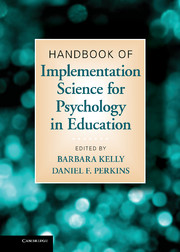Book contents
- Handbook of Implementation Science for Psychology in Education
- Handbook of Implementation Science for Psychology in Education
- Copyright page
- Dedication
- Contents
- Contributors
- Foreword
- Part I What is Implementation Science?
- Part II Statistical Problems, Approaches, and Solutions in Real-World Contexts
- Part III Preparing for Effective Implementation:
- Part IV Successful Implementation of Specific Programmes and Interventions:
- Chapter 12 Maximizing the Effectiveness of Social-Emotional Interventions for Young Children Through High-Quality Implementation of Evidence-Based Interventions
- Chapter 13 Framework for Improving the Impact of School-Based Social Competence Programs
- Chapter 14 Positive Behavior Support and Young People with Autism
- Chapter 15 Implementation of a Family-Centered, School-Based Intervention to Prevent Student Academic and Behavioral Problems
- Chapter 16 Evidence-Based Reading Interventions
- Chapter 17 Summary of Research and Implications for Practice on Reading Interventions for Young English-Language Learners with Reading Difficulties
- Chapter 18 Implementing Evidence-Based Leisure Education Programmes during School
- Part V Improving the Implementation of Evidence-Based Programmes And Interventions via Staff Skills, Organisational Approaches, and Policy Development
- Part VI Signposts Toward Effectiveness
- Index
Chapter 16 - Evidence-Based Reading Interventions
Implementation Issues for the Twenty-First Century
from Part IV - Successful Implementation of Specific Programmes and Interventions:
Published online by Cambridge University Press: 05 November 2012
- Handbook of Implementation Science for Psychology in Education
- Handbook of Implementation Science for Psychology in Education
- Copyright page
- Dedication
- Contents
- Contributors
- Foreword
- Part I What is Implementation Science?
- Part II Statistical Problems, Approaches, and Solutions in Real-World Contexts
- Part III Preparing for Effective Implementation:
- Part IV Successful Implementation of Specific Programmes and Interventions:
- Chapter 12 Maximizing the Effectiveness of Social-Emotional Interventions for Young Children Through High-Quality Implementation of Evidence-Based Interventions
- Chapter 13 Framework for Improving the Impact of School-Based Social Competence Programs
- Chapter 14 Positive Behavior Support and Young People with Autism
- Chapter 15 Implementation of a Family-Centered, School-Based Intervention to Prevent Student Academic and Behavioral Problems
- Chapter 16 Evidence-Based Reading Interventions
- Chapter 17 Summary of Research and Implications for Practice on Reading Interventions for Young English-Language Learners with Reading Difficulties
- Chapter 18 Implementing Evidence-Based Leisure Education Programmes during School
- Part V Improving the Implementation of Evidence-Based Programmes And Interventions via Staff Skills, Organisational Approaches, and Policy Development
- Part VI Signposts Toward Effectiveness
- Index
Summary
Keywords
Information
- Type
- Chapter
- Information
- Handbook of Implementation Science for Psychology in Education , pp. 277 - 297Publisher: Cambridge University PressPrint publication year: 2012
Accessibility standard: Unknown
Why this information is here
This section outlines the accessibility features of this content - including support for screen readers, full keyboard navigation and high-contrast display options. This may not be relevant for you.Accessibility Information
- 1
- Cited by
